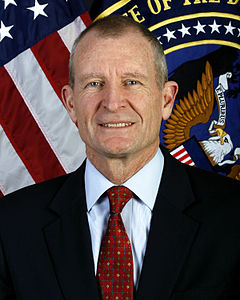Dennis Blair: Difference between revisions
Pat Palmer (talk | contribs) m (Text replacement - "United States Pacific Command" to "U.S. Pacific Command") |
Pat Palmer (talk | contribs) m (Text replacement - "Institute for Defense Analyses" to "Institute for Defense Analyses") |
||
| (One intermediate revision by one other user not shown) | |||
| Line 14: | Line 14: | ||
'''Dennis Blair''' (1947-) is an [[American people|American]] with a long record of public service, both in the [[United States Navy]] and in civilian Government service, who subsequently held senior positions in Academia, and as a consultant and commentator.<ref name=PBSNewshour2013-06-10/> | '''Dennis Blair''' (1947-) is an [[American people|American]] with a long record of public service, both in the [[United States Navy]] and in civilian Government service, who subsequently held senior positions in Academia, and as a consultant and commentator.<ref name=PBSNewshour2013-06-10/> | ||
was [[Director of National Intelligence]] for the United States, retiring as an four star [[Admiral]] in the [[United States Navy]].<ref name=KansasState2023-08-02/> Before his appointment, he served as the John M. Shalikashvili Chair in National Security Studies at the [[National Bureau of Asian Research]], and the Deputy Executive Director of the [[Project for National Security Reform]]. He had been president of the [[Institute for Defense Analyses]] from 2003-2006. | was [[Director of National Intelligence]] for the United States, retiring as an four star [[Admiral]] in the [[United States Navy]].<ref name=KansasState2023-08-02/> Before his appointment, he served as the John M. Shalikashvili Chair in National Security Studies at the [[National Bureau of Asian Research]], and the Deputy Executive Director of the [[Project for National Security Reform]]. He had been president of the [[U.S._Department_of_Defense#Institute_for_Defense_Analyses|Institute for Defense Analyses]] from 2003-2006. | ||
He was co-chair of the Council on Foreign Relations task force that wrote ''U.S.-China Relations: An Affirmative Agenda, A Responsible Course''.<ref name=Cfr2009-01-09/> | He was co-chair of the Council on Foreign Relations task force that wrote ''U.S.-China Relations: An Affirmative Agenda, A Responsible Course''.<ref name=Cfr2009-01-09/> | ||
| Line 102: | Line 102: | ||
}} | }} | ||
</ref> | </ref> | ||
}} | }}[[Category:Suggestion Bot Tag]] | ||
Latest revision as of 10:43, 3 September 2024
| This article may be deleted soon. | |||||||||||||||
|---|---|---|---|---|---|---|---|---|---|---|---|---|---|---|---|
Dennis Blair (1947-) is an American with a long record of public service, both in the United States Navy and in civilian Government service, who subsequently held senior positions in Academia, and as a consultant and commentator.[1] was Director of National Intelligence for the United States, retiring as an four star Admiral in the United States Navy.[2] Before his appointment, he served as the John M. Shalikashvili Chair in National Security Studies at the National Bureau of Asian Research, and the Deputy Executive Director of the Project for National Security Reform. He had been president of the Institute for Defense Analyses from 2003-2006. He was co-chair of the Council on Foreign Relations task force that wrote U.S.-China Relations: An Affirmative Agenda, A Responsible Course.[3] He headed the U.S. Pacific Command, and was, earlier, Associate Director of Military Support at the Central Intelligence Agency.[2] He was Director of the Joint Staff and commanded a Carrier Strike Group. While commanding the Adams-class destroyer USS Cochrane' (DDG-21), he was remembered as the first captain to water-ski behind his ship. He was a White House Fellow at the U.S. Department of Housing and Urban Development. EducationA 1968 graduate of the United States Naval Academy, he was a Rhodes Scholar at Oxford University with Bill Clinton, earning a master's degree in history and languages.[2]
References
|
|||||||||||||||
